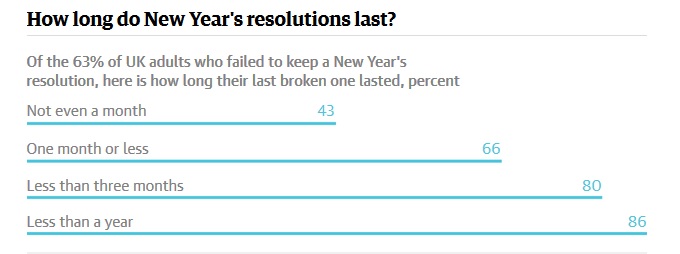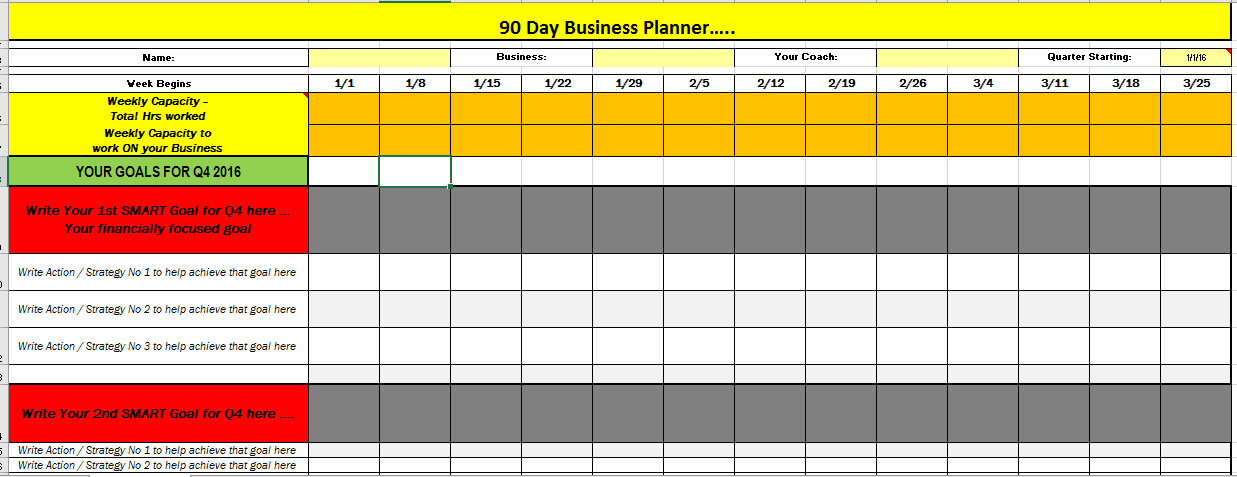New Year Resolutions Don’t Work…But 90 Day Plans Do
According to a ComRes Poll for Bupa, 63% of Brits fail to stick to their New Year resolutions. Of those, a whopping 43% don’t even keep their resolution for a full month. With these statistics in mind, it’s pretty safe to say that New Year resolutions don’t work. But millions of people continue to make them each year.
We ask: Is there a better way?
Picture courtesy of The Guardian – Source: Bupa/ComRes (November 2015)
The process of setting goals to improve ourselves certainly isn’t a bad thing, and the tradition of setting new goals each year, as though we’re learning from all that occurred in the 12 months prior, has an obvious appeal.
Ramit Sethi, author of New York Times bestseller I Will Teach You To Be Rich, says there are 3 key reasons we fail to hit our goals: they’re too vague, they’re based on willpower alone or they’re unrealistic.
Forbes writer William Vanderbloeman gave a brilliant example of why short-term goals work better than New Year’s resolutions. In an attempt to quit smoking, he chose to give up cigarettes for Lent. He told himself that it was just 6 short weeks, and that when Easter came around he could start smoking again.
With this to cling to, Vanderbloeman stuck to his resolution and when the 6 weeks were up, he didn’t want to go back to smoking.
Why? 6 weeks was attainable, far more so than ‘forever’ or ‘a whole year’.
So, if a year is too long a time period, what is the right time scale for setting goals?
90-Day Goals
We think 90 days is the perfect time scale for goal setting. It’s short enough that you can maintain momentum and focus, but long enough that you can really get stuck into a new project. Plus, it’s common practice to analyse figures on a quarterly basis so it’s likely that it fits in nicely with the general rhythm in your workplace.
Our 90-day planning workshops are the most popular events we run in London. So that’s some evidence that the approach works in real life for real entrepreneurs.
Now for the best bit…
Since we want to help you as much as possible we’ve created a free 90-day planner to help you structure and track your quarterly goals. Our planner helps you to set up your goals in three steps…
1. Write Down a maximum of 5 SMART Goals
In order to know exactly what your goals are and how they can be achieved, they must be SMART: specific, measurable, attainable, relevant and time-bound. Instead of “increase profits”, it should be “increase profits by X% by 31st March”, with X being a realistic figure based on careful analysis. You should also aim to establish no more than 5 goals within each 90-day period so that each one gets the time and focus it deserves.
[clickToTweet tweet=”In order to know exactly what your goals are and how they can be achieved, they must be SMART” quote=”In order to know exactly what your goals are and how they can be achieved, they must be SMART”]
Let’s say, for example, that your goal is to promote a new software product. Your SMART goal might be…
“By 31st August I will sell 100 units of our new product by promoting it via email newsletters, PR and direct contact with existing customers.”
2. Create An Action Plan
Write down 3 to 5 highly specific actions that you can take to help you reach each of your goals. Be as detailed as you like – the better you plan your actions, the easier it’s going to be to get results. For the SMART goal outlined above, your actions could be:
- Send a series of emails, once every 2 weeks, explaining the new product to our audience.
- Pick out 5 existing customers each week and call them to discuss whether the product might help them.
- Contact 5 bloggers relevant to my industry and ask them to review my product.
- Create a press release and send to relevant newspapers and magazines.
3. Work on Your Goal Regularly
This is the hard part – making time to ensure that your plan is carried out. In order to maintain focus and momentum, you should set time aside at least weekly to work on your goals. In our 90-day planner, we encourage you to note how many hours each week you spend on each action for each goal. This allows you to stick to a routine, see trends in your work schedule and hold yourself accountable.
In our example, imagine you’re 1 month in and you’ve only sold 20 units. You notice you’ve spent 20 hours on email marketing and press releases but 0 hours on calling existing customers. You realise that you’ve been avoiding picking up the phone and making those calls so you block out Wednesday mornings for that task.
What Can you Achieve in 90 Days?
You can, and probably should have, some kind of 1, 2 or even 5 year goals, but in order to stay focused and motivated we highly recommend you break them down into manageable 90-day plans too.
Provided that you’re diligent in setting and planning your goals, you should be able to move your business forward in a meaningful way each and every quarter – that’s how every successful business grows in the long term.
So forget the New Year’s resolutions (most people will have already given up on theirs by now!), download our free template and make yourself a 90 day plan that actually works.
Master Time Management
In This Free Ebook + Email Course You Will Learn How to:
Create the Optimum Working Environment
Manage Your Energy Better
Prioritise Effectively








